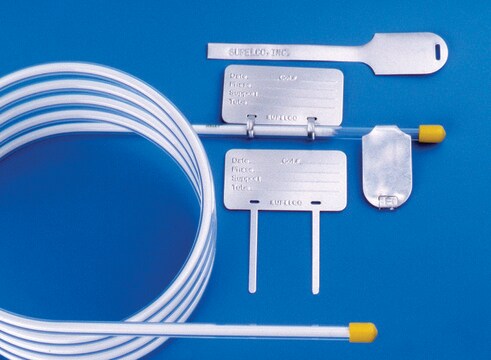21479
Methyl decanoate
analytical standard
Synonym(s):
Capric acid methyl ester, Decanoic acid methyl ester, Methyl caprate
About This Item
Recommended Products
grade
analytical standard
Quality Level
Assay
≥99.0% (GC)
shelf life
limited shelf life, expiry date on the label
technique(s)
HPLC: suitable
gas chromatography (GC): suitable
refractive index
n20/D 1.425 (lit.)
n20/D 1.426
bp
108 °C/10 mmHg
224 °C (lit.)
mp
−14-−11 °C (lit.)
density
0.871 g/mL at 20 °C (lit.)
application(s)
cleaning products
cosmetics
flavors and fragrances
food and beverages
personal care
format
neat
functional group
ester
shipped in
ambient
storage temp.
room temp
SMILES string
CCCCCCCCCC(=O)OC
InChI
1S/C11H22O2/c1-3-4-5-6-7-8-9-10-11(12)13-2/h3-10H2,1-2H3
InChI key
YRHYCMZPEVDGFQ-UHFFFAOYSA-N
Looking for similar products? Visit Product Comparison Guide
General description
Application
- Gas chromatography-tandem differential mobility spectrometry (DMS) based separation and quantification of 16 methyl- and ethyl- fatty acid esters from biodiesel samples
- Development and validation of a gas chromatography-flame ionization (GC-FID) method to determine fatty acid methyl esters (FAMEs) in beer wort samples following their solid phase extraction and BF3 based methylation
- Multi-residue analysis of 76 volatile compounds from jujube extract samples by gas chromatography-mass spectrometry (GC-MS) after their extraction by steam distillation combined with drop-by-drop extraction
- Comparative analysis of gas chromatography-combustion-mass spectrometry and gas chromatography-flame ionization detector methods for the determination of fatty acid methyl esters (FAMEs) in biodiesel samples
- Identification and quantification of fatty acids in walnut and coconut oil samples by gas chromatography-mass spectrometry (GC-MS) after their methyl esterification by BF3-MeOH method
- Simultaneous determination of fatty acids in bovine colostrum samples by GC-FID after their derivatization to ester forms using an acidic catalyst boron trifluoride
Other Notes
Recommended products
Signal Word
Warning
Hazard Statements
Precautionary Statements
Hazard Classifications
Aquatic Acute 1 - Aquatic Chronic 2
Storage Class Code
10 - Combustible liquids
WGK
WGK 1
Flash Point(F)
230.9 °F - Pensky-Martens closed cup
Flash Point(C)
110.5 °C - Pensky-Martens closed cup
Personal Protective Equipment
Choose from one of the most recent versions:
Already Own This Product?
Find documentation for the products that you have recently purchased in the Document Library.
Customers Also Viewed
Protocols
Separation of Methyl decanoate; Methyl dodecanoate; Methyl myristate; Methyl palmitate; Methyl caprylate; Methyl oleate; Methyl linoleate; Methyl linolenate; Methyl stearate
gc-analysis-of-a-37-component-fame-mix-g004278
GC Analysis of a 37-Component FAME Mix on Omegawax® (15 m x 0.10 mm I.D., 0.10 μm), Fast GC Analysis
Our team of scientists has experience in all areas of research including Life Science, Material Science, Chemical Synthesis, Chromatography, Analytical and many others.
Contact Technical Service









